Compliance Configuration
LEVEL INFINITE PASS provides a standardized compliance solution that is applicable to numerous countries/regions, allowing integrated games to complete configurations for compliance services easily from Player Network Console.
Custom configuration of the list of countries/regions in the login panel is supported, allowing selection of different countries/regions for various login scenarios. For more information about configuration steps, see the procedures for client or Web.
Before configuring compliance features in Player Network Console, reach out to the Player Network representative to obtain a comprehensive compliance solution.
Age verification
The age verification process includes real-name verification for PC games in South Korea, and is a prerequisite for implementing age restrictions and messaging verification. Logic for age verification has already been implemented in the LI PASS login panel, there is no need to call any additional APIs. The service will become available once it is configured in Player Network Console.
For more information about configuration steps, see the procedures for client or Web.
Customize verification methods
To better meet the compliance requirements of games across different countries and regions, LI PASS V1.28 introduces a flexible configuration system for age verification methods, allowing one of the following 5 verification types to be set for each country/region:
- Not required - Players are not required to input or select any age information, only to agree to the terms and conditions.
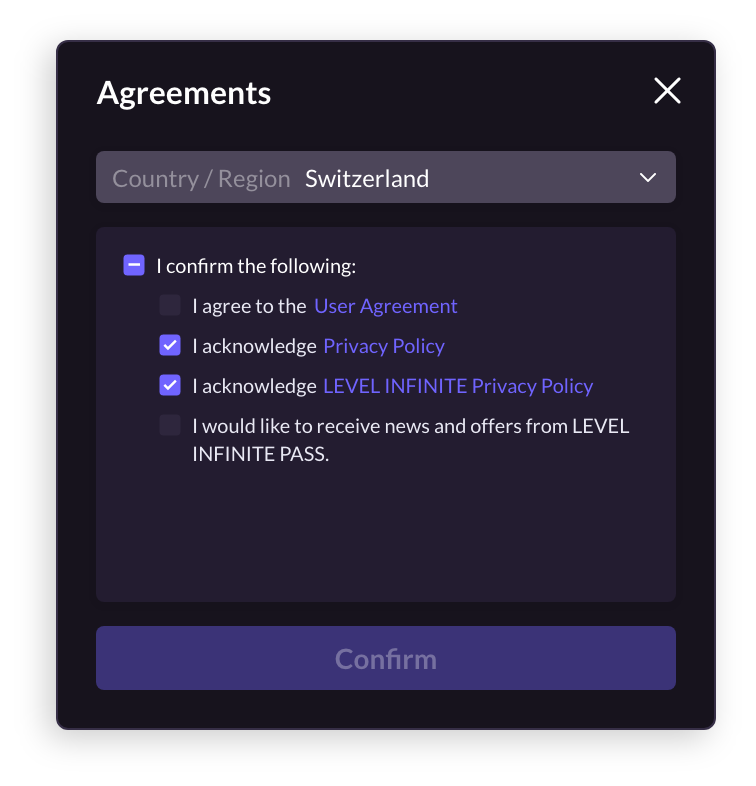
- Checkbox - Players must manually check a box to declare their age. The minimum age requirement (e.g. 16, 18) can be customized per local regulations.
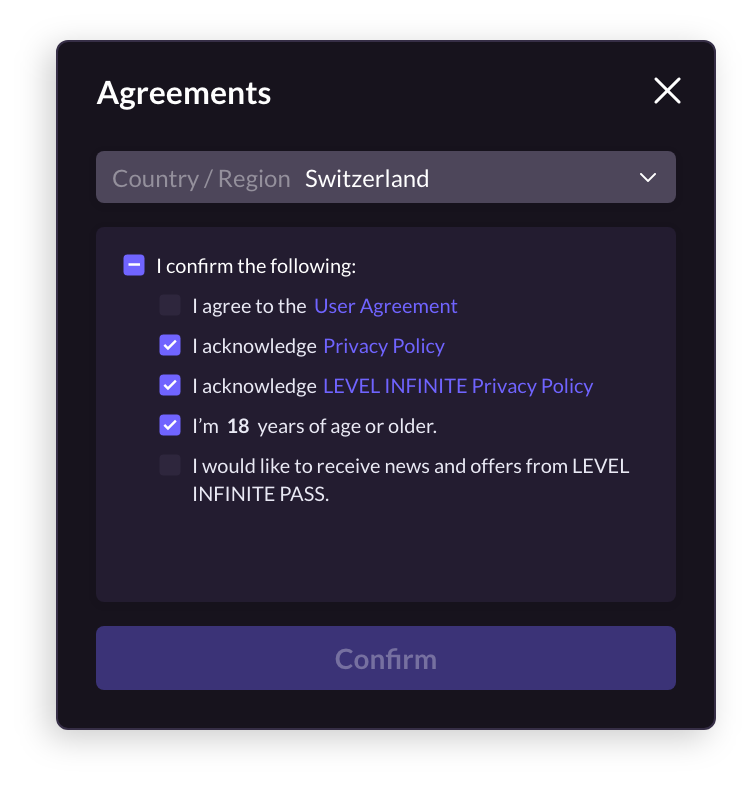
- Age range - Players select their age range from a dropdown list. Ranges can be configured based on regional legal requirements.
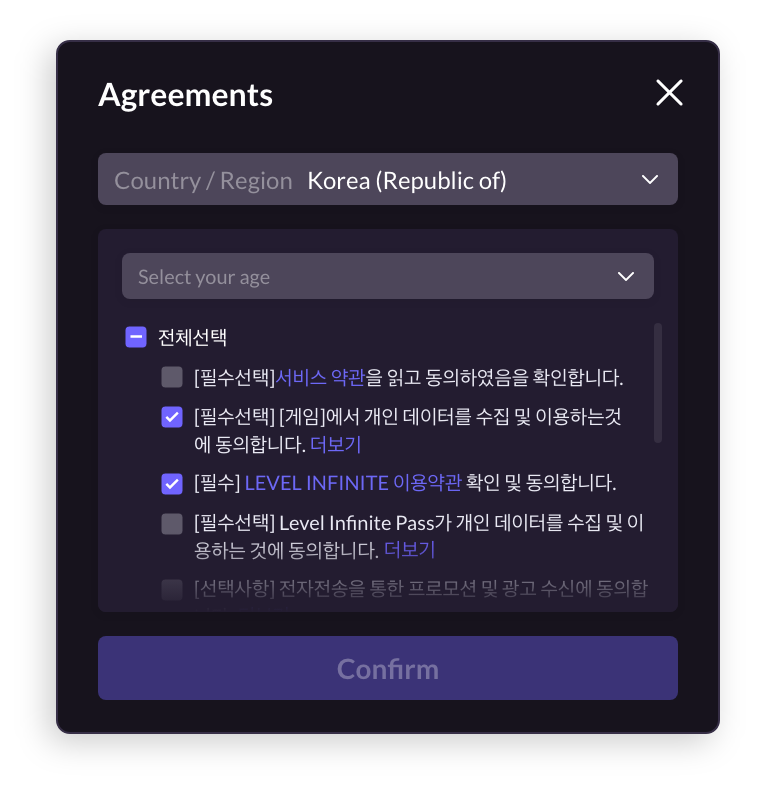
- Exact age - Players select their exact age from a dropdown menu. The system then determines whether the user meets the legal age requirement.
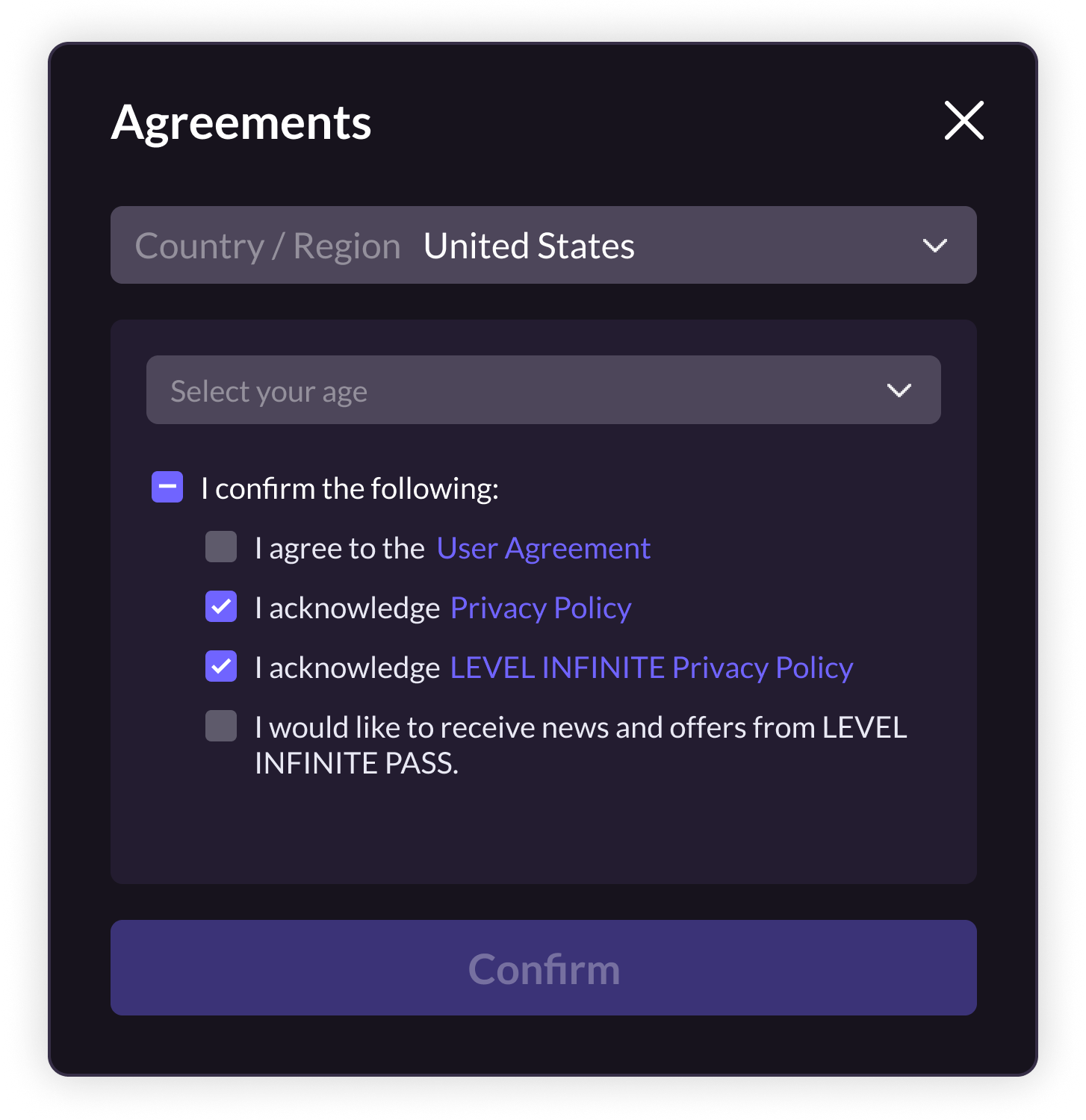
- Date of birth - Players enter their full date of birth, which the system uses to determine their age. The birthdate is not stored and is used only for verification purposes.
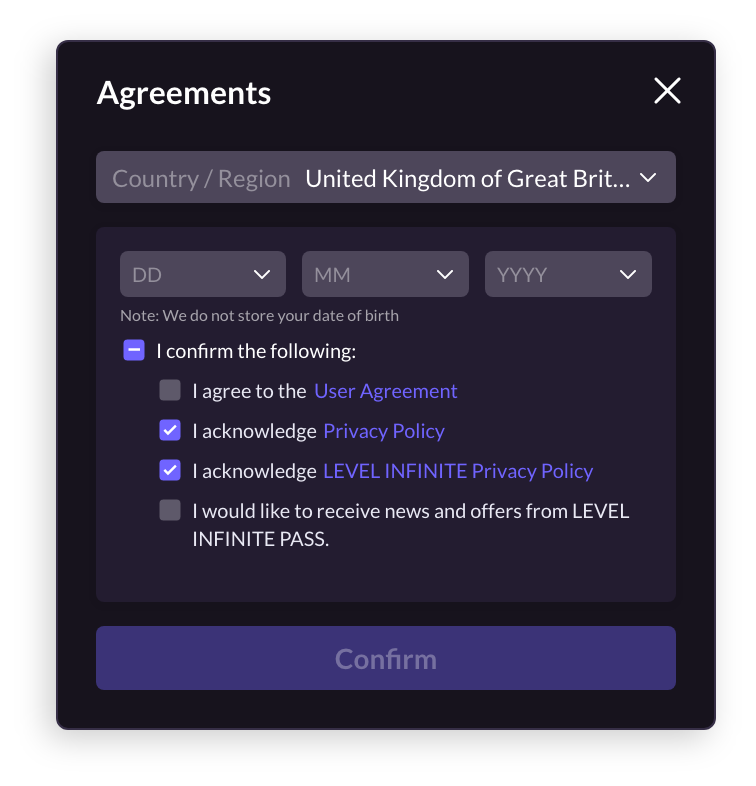
A set of default configurations covering major countries and regions has been predefined in the integrated compliance module. To customize the age verification method for each region, reach out to the Player Network representative.
Real-name verification
Your project is expected to conduct your own testing on the Korean compliance process.
According to Korean compliance requirements, real-name verification is required for PC games in South Korea. Logic for real-name verification has already been implemented in the LI PASS login panel, there is no need to call any additional APIs.
Age restrictions
Before using this service, configurations for age verification have to be completed first.
Logic for age restrictions has already been implemented in the LI PASS login panel, there is no need to call any additional APIs.
Messaging verification
According to the compliance requirements for international data privacy, for games released in select countries/regions that allow gameplay for minors, messaging (including text and voice chat) for minors will have to disabled by default. To enable the features, authorization will have to be obtained separately from parents.
The countries/regions include: the United Kingdom, the United States, Singapore, India, South Korea, Russia, all European Economic Area countries (30)
LI PASS supports obtaining parental authorization for messaging for minors in the following scenarios:
- During registration or login, when undergoing credit card/email verification (Available from SDK V1.26.00)
- After registration, before using messaging features (Available from SDK V1.17.01)
Before using this feature, the configurations for age verification have to be completed first.
To use the messaging verification feature, social feature controls has to be enabled from the backend, reach out to the Player Network representative for more details.
During registration or login
Messaging verification during the registration/login step has been integrated into LI PASS. If controls for messaging for minors are enabled, during player registration or login, messaging verification will be triggered at the end of either the credit card or email verification process, based on the region selected by the player.
Games should listen to the SOCIAL_FEATURE_APPROVE_STATUS callback event for the returned results, and handle the callback login. For more details on the returned JSON string, see SOCIAL_FEATURE_APPROVE_STATUS.
For more information, see LIEventObserver, and Handle LI PASS events.
Before using messaging
For authorization before using messaging, games are required to call the GetSocialFeatureStatus method.
When a minor attempts to use messaging features in-game for the first time, they are requested to obtain parental authorization, where an authorization email will be sent to the parent email address linked with the player's OpenID. If there is no parent email address associated with the current OpenID, the player will be requested to enter the email address of their parent.
-
Call GetSocialFeatureStatus to obtain the player's authorization status for social feature controls. The logic within the code will determine whether the player is a minor, and if messaging verification is required to be completed.
-
If messaging verification is required, WebView is opened to proceed with messaging verification for minors.
-
Games should listen to the
SOCIAL_FEATURE_APPROVE_STATUScallback event for the returned results, and handle the callback login. For more details on the returned JSON string, see SOCIAL_FEATURE_APPROVE_STATUS.
For more information, see LIEventObserver, and Handle LI PASS events.
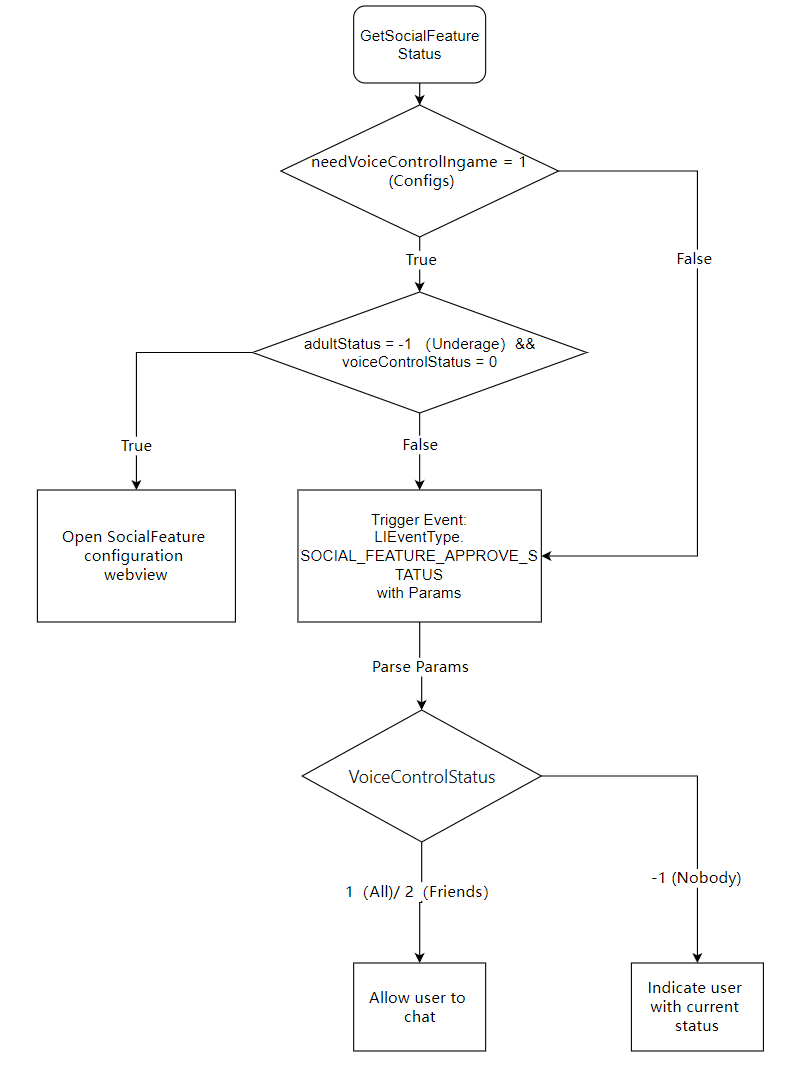
Account deletion
Logic for account deletion has already been implemented in the LI PASS Account Center, games will only need to integrate the Account Center that includes account deletion, and configure the delete account button for player use.
-
Call OpenAccountCenterWithParams to open the Account Center that includes account deletion.
-
Configure SHOW_DELETE_ACCOUNT_BUTTON to display the delete account button in the Account Center. When a player clicks on the button, LI PASS will open the account deletion HTML5 page.
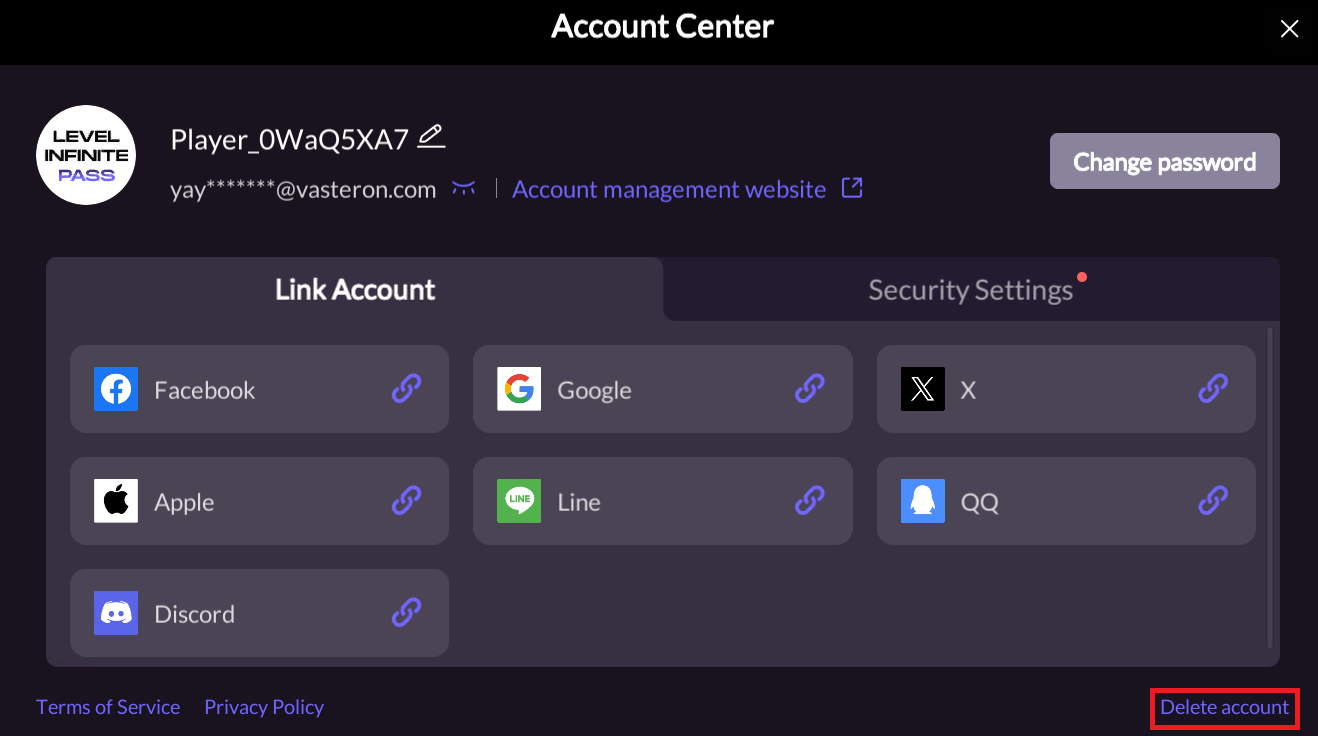
-
Games should listen to the LIEventType callback event for the returned results, with
ACCOUNT_CENTER_OPENandACCOUNT_CENTER_CLOSErepresenting the Account Center being opened or closed, andDELETE_ACCOUNT_SUCCESS,DELETE_ACCOUNT_FAIL, andDELETE_PARAMETERS_MISSINGare relevant for account deletion.
Cooling-off period
After a player submits the account deletion request, their account enters a cooling-off period set by the platform. During this period, the player can choose to log in to reactivate the account, which will cancel the account deletion application. Else, account deletion will be irreversible after the cooling-off period.
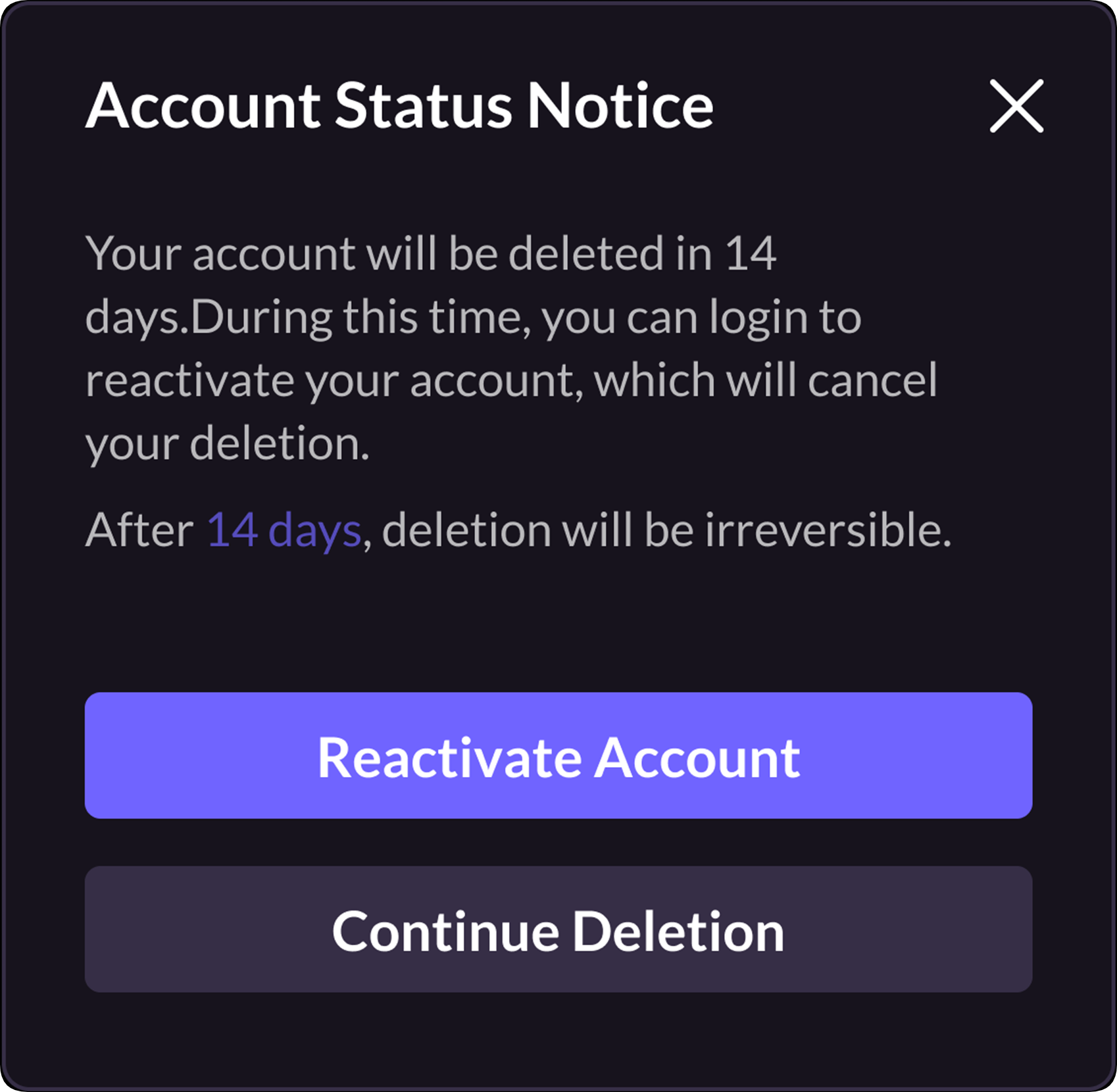
The player can click Reactivate Account to reactivate the account and enter the game, or click Continue Deletion or the close button at the top right of the popup to maintain the cooling-off state, clear their login state and be returned to the login screen.